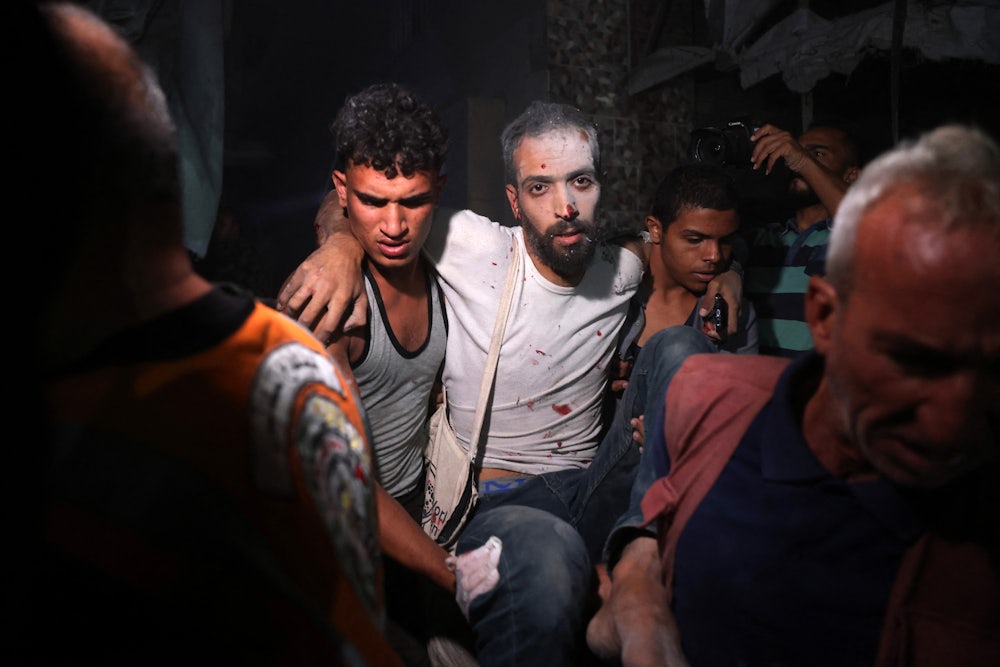The anniversary pieces are here. There will be many of them, one year after October 7, 2023, written in magazines and journals, turned into videos and segments and performed as ceremonies as well. To fixate on this date, however, is to fundamentally misunderstand its genesis and its meaning; and, perhaps most importantly, is to inevitably welcome more horrific versions of it in the future.
The temptation to reflect in this moment is tremendous. After all, this has been the bloodiest and most destructive year in the Middle East in some time, and, for Palestinians in particular, the bloodiest ever. The stories of victims from one week of the past year are enough to shatter you for a lifetime. At the same time, to focus on this year as a unique period is to separate it from the historical context that produced it and to sacrifice an understanding of how we got here and where we are going. If you are looking to read such a piece, I am sure there will be many, but this will not be one of them.
What we have witnessed in Palestine over the last year has been a continuation of what we have witnessed in Palestine over the last century. Undoubtedly, the level of violence we are witnessing now is greater than before, and, importantly, it may well pale in comparison to the level of violence we will witness a decade from now. Hard as it may be to wrap one’s head around that possibility, it is nevertheless imperative for us to do so. Unless the patterns that created this year of genocide can be broken, we should expect them to repeat—and to become worse.
The patterns at play here have shaped and bloodied the region for decades; Zionism, a political ideology imposed against the will of the people of Palestine and the broader region with Western imperial support, can be sustained only through ever increasing levels of violence. In years past, this violence has taken many forms, including interstate war and mass repression campaigns. It has now escalated to the point of genocidal violence. If they have yet to accept us after this beating, the Zionist logic goes, then we must hit them harder. After decades of operating with this logic, with the full backing of the Western powers, is it any wonder we have reached genocidal violence?
Due to a fundamental inability to see Palestinians as human beings, to see their grievances as legitimate and to recognize their rights, Western backing has had the effect of legitimizing ever increasing levels of Israeli violence against them. There was a time when Washington would condemn the targeting of Palestinian militants by Israel if such strikes also killed a handful of civilians. Then that became the norm. There was a time when Washington would oppose Israeli strikes that targeted large civilian infrastructure. Then that became the norm. There was a time when Washington opposed the targeting of health facilities. Then that too became the norm.
Every red line up the ladder to genocidal violence has been erased by continued U.S. backing. Now genocidal violence itself is being normalized. Our leaders won’t say these words, but they have given their blessings to the actions that constitute the crimes those words describe. In doing so they are laying the groundwork for genocides to come in Palestine and yes, perhaps beyond Palestine as well.
In the process, Israel has become little more than a garrison state in a perpetual state of war or preparing for the next one. This is far from the idea of a safe haven for Jews. In defense of this the West has sacrificed any notion of values or human rights and, consequently, incalculable soft power on the global stage.
Perhaps the most depressing reality of all is that the time to break these patterns and reverse course is fleeting and maybe already behind us. I used to believe and continue to believe for now that justice is the only substitute for revenge and that law, not vigilantism, is the bedrock of peaceful societies. That, however, is much harder to believe if you have lived your entire life in a refugee camp, only to be made a refugee again and again, and had your children blown to bits by bombs dropped by militaries claiming to have “moral” superiority while raining “justice” from the bellies of their death machines.
Should it be the case that the chance to break away from the pattern has already escaped us, then this year would indeed mark something different. Alongside the piles of children’s bodies in Gaza left butchered by the Israeli genocide, next to the mass graves and beneath the tons of rubble, there would lie another victim: the very possibility of a jointly imagined coexistence.






